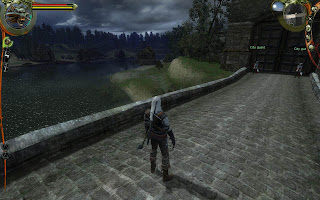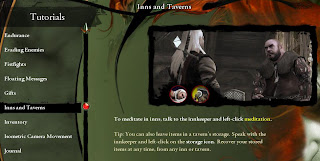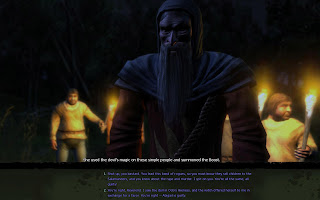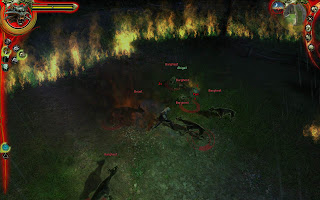To set the scene, I'm shut out of a major city, and completing quests in order to gain the trust of locals so that they will give me the means to enter the city. As part of one of these quests, I had a fight with some members of the group that attacked the fortress at the start of the game. Interestingly enough, this seemed to be the first point at which one of the choices I'd made had an effect. Choice and consequence are some of the best aspects of RPGs, so this should be right up my alley. In the aforementioned castle, I chose to try to protect the secrets of the Witchers rather than fight a dangerous beast. Apparently this made a fight turn out differently. How do I know, you ask? Because the game explicitly told me so.
A bridge over troubled choices
Some might argue this is a good thing, so that you get a clear indication of the effects of your choices, but the means in which that information was delivered was terrible. A slideshow of black and white images was presented, with Geralt giving a narration about how his choice could have "resulted in a different fight here today". The game effectively speaks to you directly as a player telling you "a past choice just mattered here by making this fight different."
For starters, having a slightly different nameless enemy in a fight is not something I consider providing a meaningful consequence. Secondly, telling the player in such a blatant manner is such a crass way of telling them their choice is meaningful. To be perfectly honest, I'd be happier if the results of choices were integrated seamlessly into the campaign and the story-telling - maybe by having people reference a decision that you've made previously. Meaningful and realistic consequences within games aren't created by drawing attention to the fact that something could have occurred differently, they're created by making it seem as though your choice is the only reality. It's not up to the game to tell you "hey, things could be different if you'd made a different choice". That merely ruins the illusion created by the game world and highlights its artificial nature, weakening the narrative rather than strengthening it.
Shortly after was when I received the first huge proverbial kick in the teeth, in an experience with the local inn. After talking to an innkeeper, I received the option to store some items. Naturally, I was curious about this, so decided to check my journal....
Retrieve at any time? Sounds good!
But the game once again proved it was not trustworthy. Without warning, the inn came under attack by a group of thugs. They surrounded and threatened one of Geralt's friends, and had slaughtered the innkeeper before I arrived. Now, with the innkeeper dead, my immediate thought was: "How do I retrieve those items I stored?" Given the journal specifically told me that I could retrieve stored items at any time, I must be able to get to them, right? Wrong. That's right, the information that's provided as meta-game information directly to the player on the mechanics of how the game works is not only inaccurate, but outright misleading. Being somewhat of an item hoarder, I had no kind words for the designers at that point for making an inexcusable deception. If I had been told about this mechanic by an NPC, that would be fine, because NPCs are unreliable sources of information. But something that tells you about the game mechanics as a player should always be accurate.
Still, after these two fairly glaring flaws, I still pushed on. Eventually I was presented with one of the game's lauded "grey" moral choices. I had to choose between supporting a witch who was ostracised by a community for selling some items used for misdeeds, or supporting the raping, murdering, enslaving villages who wanted to burn that witch. For one, this was a really mediocre "grey morality" choice. Supporting the immoral and generally despicable villagers wasn't really a thought I entertained for a second. However, the presentation of that choice was awful to the point that I didn't actually want to pick either side. Why? Because after the lengthy exposition of the events that had transpired, I was presented with the following two dialogue choices:
I hate both of these lines
I was left wondering for a few minutes how this went so hideously wrong. The setup was there, and it looked like it was going to push me to a tough decision, but then I got pummeled with reasons to detest the villagers. The guard raped a girl, the reverend allowed children to be kidnapped, and the smuggler traded with slavers, and collectively, they caused "The Beast" (a deadly dog wreathed in flame) that was responsible for the deaths of countless villagers. They give arguments that are supposed to paint the witch in a negative light, but they do so in such a weak and ineffectual manner. I kept waiting for them to elaborate on her culpability and how she'd lied to me, but all I got were weak excuses. On the other hand, the witch was larger a victim of circumstance. She attempted to provide shelter for a young boy, and at her worst she provided a poison for the raped woman to commit suicide. Her crimes paled into significance compared to her accusers.
However, the issue wasn't the weakness of the choice itself. The thing that I absolutely detested about this decision was that either option was so laden with rhetoric and rationale in addition to the actual choice itself. In picking one of the options, I wasn't only making the choice, I was being forced into a specific motivation for that choice. That is terrible decision making in a role playing game, and something that should never be forced on a player. A writer must allow the player to make the decision, perhaps with an emotional flavour, but never the specific or detailed reasoning behind that decision. As soon as that reasoning does not match the player's own reasoning, and in 99% of cases that is exactly what will happen, the "power" of making that choice is effectively destroyed for the player because they're being forced to make a decision for a reason they don't agree with. So I gritted my teeth, and made the right decision for the wrong reason and hoped things would get better.
The only problem was that after this point, it got even worse. I was forced into a fight with the "boss" of the area - the creature known as "The Beast". Boss fights after lengthy dialogues and cutscenes are a terrible, terrible idea. I don't care if they're skippable, but it is practically unforgivable if they aren't - I'm looking at you, Mass Effect. If you're a designer, never, never, ever, do this. If you have to have a fight immediately after a dialogue cutscene, please try to put an autosave just before the fight starts so the player doesn't have to sit through it again. All it does is annoy the player. If you want more proof, player Prince of Persia: The Two Thrones. When you get the twin boss fight after a chariot race, and die repeatedly, you'll know exactly what I mean.
If only I had a spectral frisbee to distract them...
But the icing on the proverbial cake was the fight itself. Pitted against The Beast and his menagerie of spectral dogs, I had to dispatch his companions before dealing with the chief enemy itself. Standard fare for a boss fight, but the fight was anything but straightforward. While killing off his minions, the boss himself would deal inordinate amounts of damage to Geralt, shredding his health to a pathetic amount by the time it turned into a one on one fight. Failing several times, I resorted to using potions to increase my health regeneration during the fight, but I was still unable to prevail. So I decided to move around a little more in the hope that with superior position I would win. This was an abject failure, as I moved to close to the boundary of the fighting zone, caught on fire and stood there helplessly while being eaten alive.
So I resorted to using my magic abilities repeatedly. This helped significantly, and perhaps I should have been doing it from the start, but I was still not able to win. At this point, after perhaps a dozen deaths, I'm not sure what I'm doing wrong. I'm not missing any of the clicks in the (hideous) click-timing combat, but I'm still getting comfortably destroyed by the boss and his minions. Let's not forget that I'm being forced to skip through a lengthy dialogue and cutscene every single time. However, on about the 14th or so attempt, my magic spell happens to stun The Beast as I unleash it a couple of seconds into the fight. This is only by virtue of me having upgraded it and given it the chance to provide this effect. Based on previous combat, I've been able to instantly kill stunned enemies, so I click on The Beast in the hope that this might occur... and success! The Beast and all its minions die instantly, resulting in a boss fight that's over in a total of five seconds.
This is pretty much the pinnacle of terrible combat or encounter design. An encounter that results in the player's death except due to sheer luck, at which point it ends in victory after a few seconds signifies a system that doesn't reward intelligent play, but instead the gross chance of being fortunate enough to have an "instant-kill" percentage effect come off. The game already has something that relies entirely on luck and not on skill: its "dice poker" mini-game. When combat is reduced to this level, it's not only a chore, but an annoyance.
I'm trying hard to like The Witcher, I really am. But every time I begin to think it might not be so bad, the game demonstrates an abject disrespect of both the player and the roleplaying genre in general. There might be some things that The Witcher has done right (as its advocates keep telling me), but they are just so horribly overshadowed by glaring shortcomings that I'm finding it extremely hard to motivate myself to click that button that says "Play".








Not much to say here other than I agree with most points you made. On my first playthrough, I pressed on through Act 2 (which I guess you just started) but after that I lost interest. I forced myself to finish the game at a later time, and I did, but I didn't enjoy it.
ReplyDeleteI think the choices are supposed to be written from the eyes of Geralt (I haven't read the books so I don't know how accurate his character is). I can accept that generally speaking but the bad writing is... yeah. Doesn't help.
I do however enjoy the little slideshow presentation and ruminations of Geralt when you encounter a consequence of your choice. It's definitely not something I would like for every game at all but I think it, stylistically speaking, fit in quite well in the game even though it's a bit a heavy-handed. I think more than anything I'm a sucker for games that use artwork inside the game like that, god knows why, but there you go.
Yep, you pointed out some other flaws of the witcher.
ReplyDeleteEspecially I totally agree with the fight with the spectral hounds.
About the player choices I think that the situation you pointed out (the one where the game alert the player) could be a "introduction" to show explicitly that the player have to choose. But maybe they are gone too far, I am not sure about this. I'm a player who knows about choices, maybe others not and they need this kind of introduction.
But you already made another hidden decision that you seems not aware of (little spoiler: the one to help the smugglers).
About the easiness of the moral decision I think it is because you're on the beginning, after there will be choices more difficult (and some other easy enough).
Hmm, you're definitely showing that you didn't continue playing. The things that you stored in that chest are still there when you reach the next inn, INSIDE the city. You weren't that far from reaching the next chapter (if you could've beaten the Beast that is)
ReplyDeleteYou're basically saying you would've liked it better if the different replies to the reverend in that situation were "Yes" or "No" so you could ( in your own mind) decide the reasoning for the choice ? Personally, I think the replies were pretty much Geralt, the role you play in game.
You were presented with a choice and you didn't like either of the two options. Guess what ? I think that was kinda the point, making a choice where you don't really want to since you dislike them both.
You're complaining that you have to combine several different things in combat? Potions, magic AND evasive maneuvers in the same fight ? That you can't just swing the sword and win ?
The Witcher definitely has its shortcomings, and there's still more to come throughout the game. Act 1 wasn't all that great. It was downright terrible I think, but it starts to pick up in Act 2 and beyond. A few of the other gripes I had with The Witcher was the following:
ReplyDeleteThe illusion that your choice really mattered. Despite whatever choice you made, the end result is always the same after the game is over. They force the plot in one direction despite whatever choices you may have fought for. How anticlimatic. The only difference is you'll have a slightly different playthrough at the end depending on whether you choose the Elves or the Order.
All of your choices are centered around choosing the lesser of two evils. Whether it be the villagers vs the witch, elves vs the order, neither side is right, and you're forced to choose between the two until Act IV where you can actually just walk away. Both sides are ignorantly blinded by hate, and for some reason Geralt cant seem to tell the Order what is really going on.
The swamps is one area you'll learn to get tired of and fast. You have to spend an ENORMOUS amount of time in a boring environment and those fat exploding slugs don't make your trip through the swamps more enjoyable.
About the first boss fight with the Beast in The Witcher. It is by far, the hardest in the game, and there's not a single boss fight that can compare. Not to mention the design of enter the cabin and being greet by a bunch of Salamanders. Talk about RAGE after trying many many times to win that fight. It was very bad design on their part.
The Witcher has its good moments and it has its bad. Its concept of choice wasn't the greatest though.
Ya I agree with the (3rd?) poster. You keep reacting as if you expect your responses to be your choices. What you are doing is kind of like that game you keep mentioning in your blog, where you o nly choose the reaction; the words, at least to me, were very clearly that of Gerault, a very unique individual, definitely not my own. Its like reading a book that can unfold slightly differently in each read, even thought the protagonist is the same guy. But again I dont know anything about the witcher i just heard the name and then i went and bought it used.
ReplyDeleteI never really had much problem after the 2nd chapter in combat; I had figured out the magic and sword work and the dodging tactics. You will too perhaps.
Incidentally that fight wasn't based on luck. It was based on finding the trick, much like a (proper) D&D boss fight would go: memorizing resist energy to face down multiple wizards or conversely memorizing hold person to take down strong melee fighters with low will. Is it luck when you are basically immune to the fights once you figure out the trick (which takes you a few tries)?
ReplyDeleteI agree that the long dialogue first is stupid but that happens in a lot of games as well. It seems at this point you are seeing flaws that aren't flaws so perhaps best to pass this title over, as the game doesn't drastically change from here on.
the game IS based on a book(s) fyi
ReplyDeleteIt wasn't my intent to cause such a storm with this appraisal, but I've apparently roused the ire of a number of people.
ReplyDeleteJarigan: Yes, I would. I would have much preferred to get a simply "yes" or "no" response because I view roleplaying as me providing the personality of the individual, whereas The Witcher apparently does not let you do that - you are forced into Geralt's persona. I suppose keeping that in mind, I can be a little happier, but it will still feel like I'm not truly roleplaying because I'm being forced to occupy a personality I don't really like.
Eguintir: I'd still argue it was based on luck. Maybe I could go in and use group style and try to dispatch the enemies and dodge them, but there was virtually no difference in my approach to the last half a dozen attempts except that on the final one the stun came off and allowed me to one-shot the beast.
I think I perhaps had my expectations set too high after hearing people talk about how amazing the game was. I'll persevere with a little more optimism... or perhaps now with expectations that will more closely match what the game actually delivers.
Uhm, don't know, but if it is all too terrible to bear for you, why don't you just stop playing? Maybe try again some time later, after you got some distance (worked for me with Jade Empire)?
ReplyDeleteOr, if you don't like Geralt from a roleplaying point of view and feel you are being forced into his persona, just skip it. No sense in going on. It will result in more and more posts about some (percieved) flaws, in more comments saying "You are so right, Witcher sucks!" and in more comments saying "You are so wrong, Witcher rocks!".
Go back playing something you like (the ever-perfect, flawless Dragon Age) and actually have fun! That is the sense behind a hobby. There is no shame in not finishing a game because you think it sucks.
Even if you say you want to like the game, I honestly don't get the impression you do. Jarigan and Eguintir already said what I was about to say about your post, so I won't repeat it, to prevent this from becoming a "You are so wrong, Witcher rocks!"-comment.
Best regards
Admittedly, this post was made in somewhat fresh frustration at the flaws or what I consider to be poor design choices within the game. So it was possibly harsher than I intended.
ReplyDeleteI can see elements of a good game in it, it's more that the game wasn't what I had been led to expect. I don't think Dragon Age is flawless (and I've said as much in numerous posts), but I did enjoy it because I got a game that generally matched my expectations of it. At the very least, I've been encouraged to click that "play" button again, and for what it's worth, the stint I've had this evening has been fairly enjoyable.
I like discussion, and I like trying different games. Call it a (semi-)professional interest in playing games to analyse design issues within them. Sometimes people might consider my process of analysis gets in the way of the "fun", but I like being able to articulate what it is I do or don't like about a game. By playing games I hope to be able to develop better mods (and games if I ever get hired by a game developer) through having played a variety of games with different approaches and design decisions.
I'm not seeking validation of my opinion when I post on this blog, I'm merely raising a point of view. I like hearing other people's points of view and their rationale for their likes and dislikes, regardless of whether they share my opinion or not. Sure, everyone likes having people agree with them, but I don't want this blog to turn into a string of "I agree. You're awesome." comments. Heck, if I wanted to only hear how much people agreed with me, I wouldn't have the "meh" and "disagree" reaction buttons on my blog. I think people can possibly learn more from those with whom they have a difference of opinion than those with whom they agree, because they're forced to provide evidence and go through a thought process to justify their position.
To clarify, I'm not saying you shouldn't comment if you agree with me, but I'm definitely saying don't without a comment if you disagree.
You don't have my ire, as really the most memorable part of Witcher was the final chapter and mostly the end for me. I never heard it was great nor claimed it was.
ReplyDeleteBut I don't think it should be a chore to play. This coming form someone whos two year NWN2 campaign is now in beta test and personally I can't stand the nwn2 game engine or toolset anymore. I can defintiely say it wasnt worth stick to it.